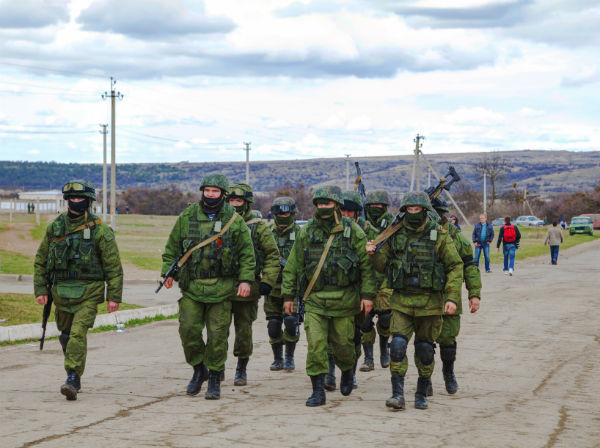 Russian soldiers marching on March 5, 2014 in Perevalne, Crimea, Ukraine.No amount of international sanctions will reverse Russia’s takeover of Crimea. But unless Vladimir Putin can now extend his influence over eastern Ukraine, the incomplete triumph could undermine him.
Russian soldiers marching on March 5, 2014 in Perevalne, Crimea, Ukraine.No amount of international sanctions will reverse Russia’s takeover of Crimea. But unless Vladimir Putin can now extend his influence over eastern Ukraine, the incomplete triumph could undermine him.
If expansion stops now, Putin will have stretched the supply lines to a vital Black Sea naval base that Russia already controlled. He’ll also have tipped the electoral balance in the rest of Ukraine towards the pro-European west . Future elections in a Crimea-free Ukraine, if democratic, are much less likely to return pro-Russian presidents like the ousted Viktor Yanukovich.
Expert opinion seems fairly clear that that the wider “West” can do little, even if Putin – to avoid Pyrrhic victory – now seeks to “protect” the Russian-majority areas in eastern Ukraine. Interim government representatives say a further land-grab is imminent, while most external commentators say Russia will stop short of it. Even if Crimea-style “pro-Russian militia” seize power elsewhere, there’s a consensus that western Europe can only wring its hands , because they carry no big stick.
Although EU governments worry intensely about the rule of law being overthrown on their eastern border, they worry more about the loss of gas, oil and strategic mineral supplies that Russia controls, and investments their multinationals have already made there.
International-relations “realists” say the EU can’t bear the cost of meaningful sanctions, especially when nursing a fragile recovery from long recession. Nor can NATO contemplate military intervention, after decade-long actions in Afghanistan and Iraq whose dubious legal basis makes it anyway harder to condemn Putin’s deeds.
So “punishment” will mean forcing a few oligarchs to holiday on the Black Sea instead of the Riviera. Russia will laugh off the “isolation”, and savour its latest success in regaining the “near abroad ”.
Revanchism trips on the resource curse
But this implicit acceptance of Russia’s move, echoed in the critical Anglophone as well as the tame Russophone media, seriously understates both the extent and the effectiveness of the EU’s likely response.
It’s true that heavy reliance on Russia as an energy supplier and major export market limits scope for a serious trade embargo in the short term. But the strongest calls for reaction against Russia have come from the Baltic states , which have the strongest economic ties to Russia and disaffected Russian minorities.
For these governments, isolating Russia is the long game, and Crimea provides the ideal pretext. The Baltics have already redirected most of their exports to the EU, and are fast reducing their dependence on Russia for energy . They’d also like more reasons to close the door on giant Russian companies that threaten to buy up strategic assets .
But the Baltics only carry so much clout within the EU. More decisively, weakening trade and investment links with Russia is consistent with the larger countries’ structural change plans – especially Germany’s drive to substitute Gazprom’s gas with renewables and clean coal.
That couldn’t be done immediately without drawing on the US’s strategic oil stocks and emerging gas surplus, but this is something the Congressional leadership is already open to . Russia’s threat to retaliate by shutting the gas taps is weakened by subsiding demand as the weather warms, alternative pipelines, and Gazprom’s chronic cashflow weakness which means it can’t halt flows for long without somewhere else to send them.
Realists warn that isolating Russia for any appreciable time will encourage it to strengthen ties with large non-Western energy producers and consumers including China, widening its influence and so backfiring against the EU.
But this overlooks long unresolved Russia-China tensions, and inequalities in the partnership that would disadvantage Moscow. These arise from its snail-paced post-Soviet modernisation , which means China can now engage with Putin’s Russia as it does with Africa – as a supplier of superior technology and organisation in return for cheap natural resources.
Russia grew like a “BRIC” in Putin’s first decade, giving the impression of lasting strength. But economic policies shaped for natural-resource oligarchs are now shackling its economy. It shrank when world oil prices fell in 2009, and was already stalling again before the self-created shocks on its border. It will feel the pain if Ukraine now defaults on debts to Russia nearing US$30 billion .
Putin’s need for the EU and IMF to prop up Ukraine economically, to spare him the embarrassment of another recession and possible banking crisis, may be what forces him to stop at the Crimean border. If he goes further, the appetite for sanctions on Russia is stronger than the “realists” recognise. And Russia’s ability to withstand them is far lower than business leaders and fund managers now trapped in Moscow would care to admit.
No comments:
Post a Comment